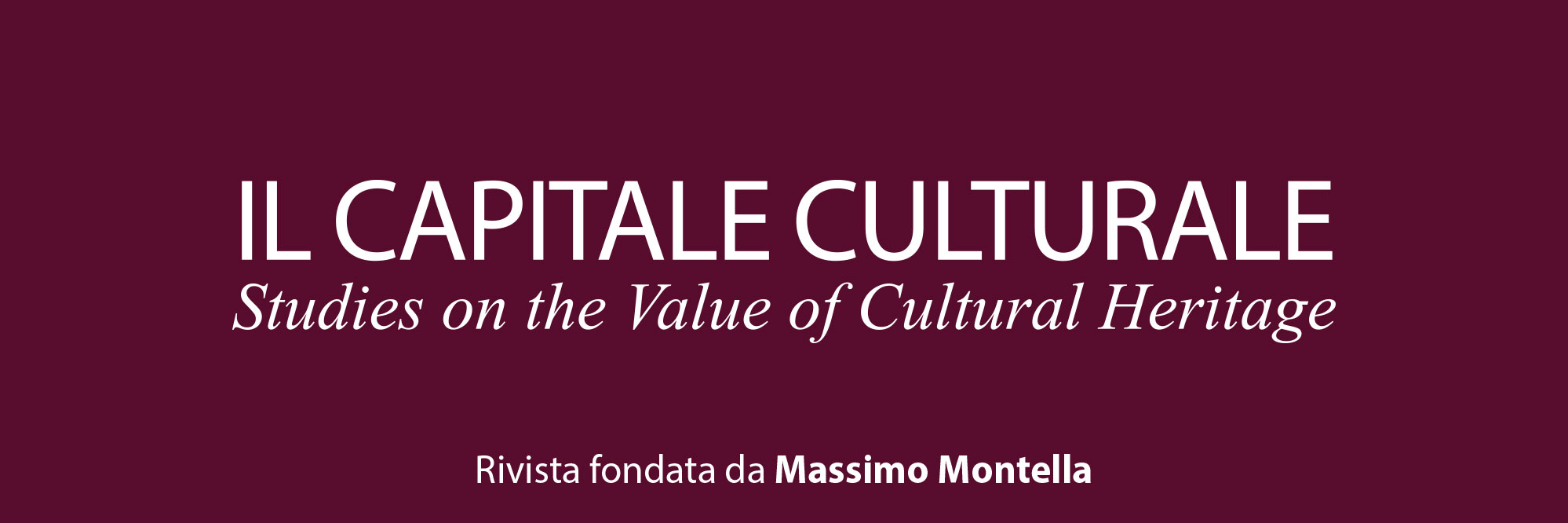Searching for Schiavoni intellectuals
Downloads
Additional Files
Pubblicato
Fascicolo
Sezione
Licenza
Tutti i materiali pubblicati sono coperti da copyright, mantenuto dall'Università di Macerata che ne supporta finanziariamente e tecnicamente la pubblicazione.
La licenza adottata è la Creative Commons - Attribuzione/Condividi allo stesso modo. Ovvero, gli autori che pubblicano su questa rivista accettano le seguenti condizioni:
- Gli autori mantengono i diritti sulla loro opera e cedono alla rivista il diritto di prima pubblicazione dell'opera, contemporaneamente licenziata sotto una Licenza Creative Commons - Attribuzione che permette ad altri di condividere l'opera indicando la paternità intellettuale e la prima pubblicazione su questa rivista.
- Gli autori possono aderire ad altri accordi di licenza non esclusiva per la distribuzione della versione dell'opera pubblicata (es. depositarla in un archivio istituzionale o pubblicarla in una monografia), a patto di indicare che la prima pubblicazione è avvenuta su questa rivista.
- Gli autori possono diffondere la loro opera online (es. in repository istituzionali o nel loro sito web) prima e durante il processo di submission, poiché può portare a scambi produttivi e aumentare le citazioni dell'opera pubblicata.
DOI:
https://doi.org/10.13138/2039-2362/1849Abstract
The art history term of “Schiavoni” - used for artists born in Croatia, or Dalmatia, and active abroad, mostly in Italy - is completely absent from the Croatian literary history. No such history will, however, dare to omit the category of “Croatian authors outside their homeland”. The paper interprets the theoretical framework that is causing such discrepancy between the disciplines and proposes to consider both artists and writers as intellectuals. In that context, inspired by Antonio Gramsci’s theory of the role of intellectuals in the process of social change, the dynamic relationship between the intellectuals and the Schiavoni community can be fruitfully explored; for example, four intellectuals from the island of Korčula, active in the Schiavoni confraternity of St Jerome in Rome in 1550-1565, can be identified as a small social network strengthened by multiple alliances.
Il termine storico-artistico “Schiavoni” - usato per artisti nati in Croazia, o in Dalmazia, e attivi all’estero, soprattutto in Italia - è completamente assente dalla storia letteraria croata. Nessuna storia, tuttavia, oserà omettere la categoria di “autori croati al di fuori della loro patria”. Il saggio interpreta il quadro teorico che causa tale discrepanza tra le discipline e propone di considerare sia gli artisti che gli scrittori come intellettuali. In tale contesto, ispirato dalla teoria di Antonio Gramsci sul ruolo degli intellettuali nel processo di cambiamento sociale, la relazione dinamica tra gli intellettuali e la comunità di Schiavoni può essere proficuamente esplorata; ad esempio, quattro intellettuali dell’isola di Korčula, attivi nella confraternita Schiavoni di San Girolamo a Roma nel 1550-1565, possono essere identificati come un piccolo social network rafforzato da molteplici alleanze.
Riferimenti bibliografici
Batušić N., Bogišić R., eds. (1991), Dani Hvarskog kazališta 17: hrvatski humanizam: Dubrovnik i dalmatinske komune, Split: Književni krug.
Čoralić L. (2001), U gradu svetoga Marka. Povijest hrvatske zajednice u Mlecima, Zagreb: Golden marketing.
Frangeš I. (1987), Povijest hrvatske književnosti. Zagreb; Ljubljana: Nakladni zavod Matice hrvatske; Cankarjeva založba.
Glavičić B. (1991), Epika Ivana Polikarpa Severitana, in Batušić, Bogišić 1991, pp. 191-206.
Gortan V. Vratović V., IJsewijn J. (1971), The Basic Characteristics of Croatian Latinity, «Humanistica Lovaniensia», vol. 20, pp. 37-68.
Gudelj J. (2015), San Girolamo dei Croati a Roma: gli Schiavoni e il cantiere sistino, in A. Koller, & S. Kubersky-Piredda (eds.), Identità e rappresentazione. Le chiese nazionali a Roma 1450-1650, Rome: Campisano, pp. 297-325.
Gudelj J. (2016), The Hospital and Church of the Schiavoni / Illyrian Confraternity in Early Modern Rome, «Confraternitas», 27,1-2, pp. 5-29.
Ivić N. (2007), Conceiving of a Croatian Literary Canon, 1900-1950, in History of the literary cultures of East-Central Europe: junctures and disjunctures in the 19th and 20th centuries, edited by M. Cornis-Pope, J. Neubauer, Amsterdam: John Benjamins, pp. 395-403.
Jurić Š. (1993), Zbornik književnih radova Korčulanina Nikole Petrovića, «Anali Zavoda za povijesne znanosti u Dubrovniku», 21, pp. 161-198.
Kapor A. (1983), Korčulani i Zavod sv. Jeronima u Rimu, «Croatica Christiana periodica», Vol. 7 No. 11, pp. 112-119.
King M. L. (1978), The Social Role of Intellectuals: Antonio Gramsci and the Italian Renaissance, «Soundings: An Interdisciplinary Journal», 61, pp. 23-46.
Kombol M. (1945), Poviest hrvatske književnosti do narodnog preporoda, Zagreb: Matica hrvatska.
Körbler Đ (1912), Život i književni rad Nikole Brautića Lopuđanina (1566–1632), «Rad JAZU», 192, pp. 1-96.
Lowenthal L. (1932), On Sociology of Literature, <https://www.marxists.org/reference/archive/lowenthal/1932/literature.htm>, 10. 2. 2018.
Pantar N. (2012), Antun Rozanović: Obrana Korčule od Turaka 1571: rukopisi Državnog arhiva u Zadru i Državnog arhiva u Dubrovniku, Diploma Thesis, University of Zagreb, Faculty of Humanities and Social Sciences, Department of Classical Philology. <http://darhiv.ffzg.unizg.hr/4130/>, 10. 2. 2018.
Perić O. (1991), Nepoznati opus Franje Nigera, in Batušić, Bogišić 1991, pp. 231-240. <https://hrcak.srce.hr/99845>, 10. 2. 2018.
Pignatti F. (2004), Komulovic, Alexandar, in Dizionario biografico degli Italiani, 62, Roma 2004, pp. 757-759, <http://www.treccani.it/enciclopedia/komulovic_(Dizionario-Biografico)/>, 10. 2. 2018.
Prijatelj K. (1991), Likovni umjetnici ‘Schiavoni’ iz Dalmacije u 15. stoljeću, in Batušić, Bogišić 1991, pp. 260-269.
Soave A. (2014), Storia degli intellettuali italiani, in A. Gramsci, I quaderni del carcere, <https://quadernidelcarcere.wordpress.com/tag/przezdziecki-renaud/>, 10. 2. 2018.
Špoljarić L. (2018), Venecijanski Skjavoni i povijesno-liturgijska knjižica u čast sv. Jeronima Ilira iz 1498. godine, «Colloquia Maruliana», XXVII, in press.
Vodnik B. (1913), Povijest hrvatske književnosti. Knjiga I: Od humanizma do potkraj XVIII. Stoljeća, Zagreb: Matica hrvatska.




